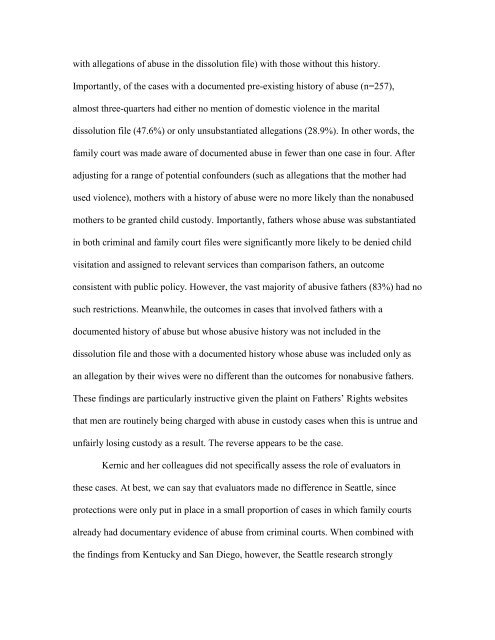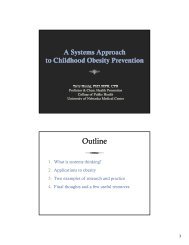Rethinking Child Custody, Domestic Violence - Rutgers NJAES ...
Rethinking Child Custody, Domestic Violence - Rutgers NJAES ...
Rethinking Child Custody, Domestic Violence - Rutgers NJAES ...
You also want an ePaper? Increase the reach of your titles
YUMPU automatically turns print PDFs into web optimized ePapers that Google loves.
with allegations of abuse in the dissolution file) with those without this history.Importantly, of the cases with a documented pre-existing history of abuse (n=257),almost three-quarters had either no mention of domestic violence in the maritaldissolution file (47.6%) or only unsubstantiated allegations (28.9%). In other words, thefamily court was made aware of documented abuse in fewer than one case in four. Afteradjusting for a range of potential confounders (such as allegations that the mother hadused violence), mothers with a history of abuse were no more likely than the nonabusedmothers to be granted child custody. Importantly, fathers whose abuse was substantiatedin both criminal and family court files were significantly more likely to be denied childvisitation and assigned to relevant services than comparison fathers, an outcomeconsistent with public policy. However, the vast majority of abusive fathers (83%) had nosuch restrictions. Meanwhile, the outcomes in cases that involved fathers with adocumented history of abuse but whose abusive history was not included in thedissolution file and those with a documented history whose abuse was included only asan allegation by their wives were no different than the outcomes for nonabusive fathers.These findings are particularly instructive given the plaint on Fathers’ Rights websitesthat men are routinely being charged with abuse in custody cases when this is untrue andunfairly losing custody as a result. The reverse appears to be the case.Kernic and her colleagues did not specifically assess the role of evaluators inthese cases. At best, we can say that evaluators made no difference in Seattle, sinceprotections were only put in place in a small proportion of cases in which family courtsalready had documentary evidence of abuse from criminal courts. When combined withthe findings from Kentucky and San Diego, however, the Seattle research strongly










